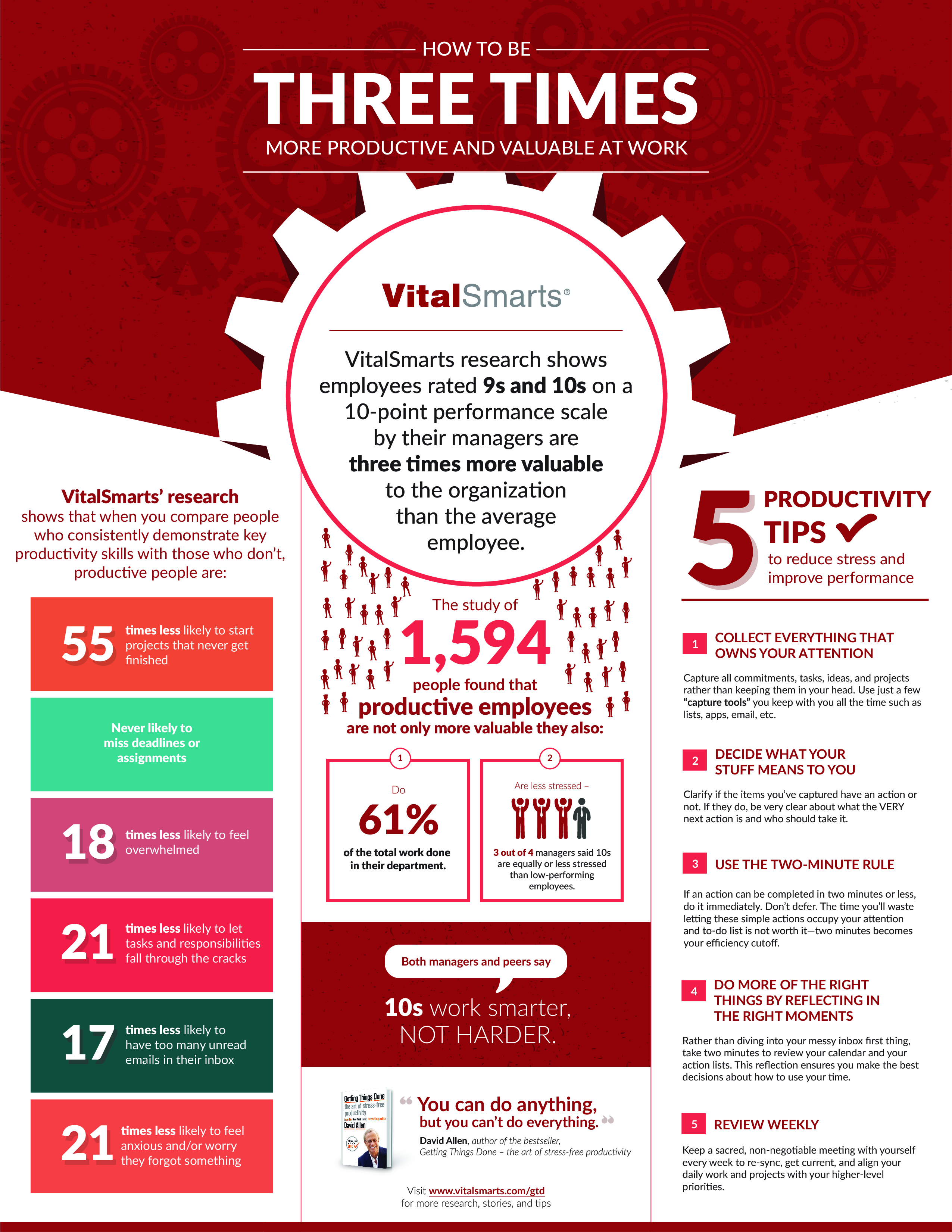
FEATURE (PRNewswire) – It’s no surprise managers rate top performers as their most valuable employees. But what might not be as obvious is the massive impact a top performer has on the organization. A new study by VitalSmarts revealed employees rated by their managers as a “9” or “10” on a 10-point performance scale are three times more valuable to the organization than the average employee.
The study of 1,594 managers and employees, conducted by VitalSmarts’ researchers David Maxfield and Justin Hale, also revealed that productive employees are not only more valuable, but they are also responsible for 61 percent of the total work done in their departments.
Even more surprising is that while employees identified as “Tens” do more work, it’s not at the expense of their sanity or work-life balance. In fact, 83 percent of managers and 77 percent of peers say the works habits of Tens reduce their stress. Three out of 4 leaders also say higher-performing employees experience less or about the same stress levels as lower-performing peers. Overall, both managers and peers say Tens work smarter, not necessarily harder.
So what are these stress-reducing, performance-enhancing habits demonstrated by top performers?
Maxfield and Hale asked managers and peers to describe the positive work habits top performers demonstrate along with the not-so-positive work habits of average performers. After categorizing the habits, they found that Tens demonstrate stellar communication and productivity practices. Common phrases used in each category include:
Communication practices
- Top Performers: “Ask for help,” “Not afraid to ask questions,” “Know who to go to,” “Know when to ask.”
- Average Performers: “Lack of communication,” “Slow to respond,” “Don’t listen,” “Complain.”
Productivity practices
- Top Performers: “Organized,” “Good time management,” “Attention to detail,” “To do lists,” “Keep track of,” “Block time on their calendar,” “Prioritize,” “Stay on top of their work.”
- Average Performers: “Not enough time,” “Lack of attention,” “No follow through,” “Too busy,” “Late,” “Disorganized,” “Don’t meet deadlines,” “Not on task.”
Learning the productivity skills demonstrated by top performers is key to both personal and organizational success, Maxfield said.
“The message in this research is that a very small number of self-management practices literally change a person’s life and are also beneficial to the organization,” Maxfield said. “They dramatically improve performance while also reducing stress.”
Maxfield and Hale share five productivity practices of top performing employees.
- Collect everything that owns your attention. Capture all commitments, tasks, ideas and projects rather than keeping them in your head. Use just a few “capture tools” you keep with you all the time such as lists, apps, email, etc.
- Decide what your stuff means to you. Clarify if the items you’ve captured have an action or not. If they do, be very clear about what the very next action is and who should take it.
- Use the two-minute rule. If an action can be completed in two minutes or less, do it immediately. Don’t defer. The time you’ll waste letting these simple actions occupy your attention and to-do list is not worth it – two minutes becomes your efficiency cutoff.
- Do more of the right things by reflecting in the right moments. Rather than diving into your messy inbox first thing, take two minutes to review your calendar and your action lists. This reflection ensures you make the best decisions about how to use your time.
- Review weekly. Keep a sacred, non-negotiable meeting with yourself every week to resync, get current and align your daily work and projects with your higher-level priorities.
VitalSmarts’ research shows when you compare people who consistently demonstrate key productivity skills with those who don’t, productive people are the following:
- Fifty-five times less likely to start projects that never get finished.
- Twenty-one times less likely to experience tasks and responsibilities falling through the cracks.
- Never likely to miss deadlines or assignments.
- Seventeen times less likely to have an inbox with too many unread emails.
- Eighteen times less likely to feel overwhelmed.
- Twenty-one times less likely to feel anxious and/or worry they forgot something.
This research is key for managers looking to increase the performance of their team, Hale said. He said:
Productivity is more than just being busy. Employees who learn to manage their workload quickly and efficiently don’t just get more done, they get more of the right things done. They stop carrying the weight and anxiety of work and free up their time and mental capacity for new and better ideas. It’s a win-win for both the individual and the business.

About VitalSmarts
Named one of the Top 20 Leadership Training Companies, its news release states, VitalSmarts is home to the award-winning Crucial Conversations, Crucial Accountability, Getting Things Done and Influencer Training and New York Times bestselling books of the same titles. VitalSmarts has consulted with more than 300 of the Fortune 500 companies, its release states, and trained more than 1.8 million people worldwide.
Email: [email protected]
Twitter: @STGnews